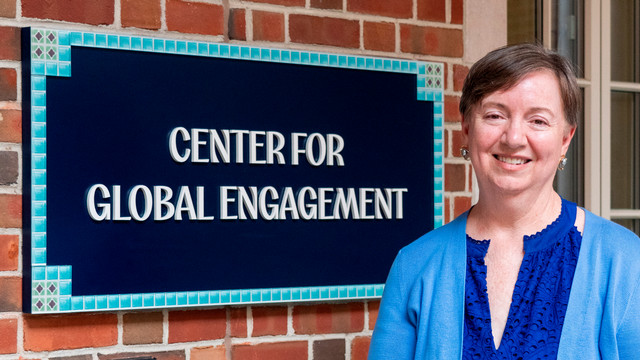International Education
A look at UR’s Center for Global Engagement
UR’s home for study abroad, international students, and related initiatives has a new name: the Center for Global Engagement. We checked in with Dean Martha Merritt.
How has the center changed since you became dean a decade ago?
Beginning as a new dean was a good opportunity to review the portfolio. For example, as we pared down programs that were not drawing students, we added new places of significance, especially for business school exchanges and language immersion.
Connection among faculty has also been a focus. We reoriented the faculty seminar so that people across schools who share knowledge of a country travel there together. That has yielded measurable outcomes because we have people on campus who form a community of caring about particular places and who have subsequently received major grants to return. We then see surges in student engagement in these countries.
Why did you settle on “global engagement” as part of the new name?
It is inspiring to me as dean because it makes our goal clear. “Global engagement” means you’re relational and have a connection with partners.
We have the capacity as a university to visit a lot of places. When things feel truly relational, the engagement is reciprocal, sustained, and over time, multilayered. And students are always involved.
Another key word is “center.” Can you talk about that?
“Center” suggests that we have all sorts of different capacities to bring to bear on the goal of global engagement, and that capacity has grown a lot in recent years. And then the fourth word, “for.” I like us to be “for” global engagement rather than “of” it. Perhaps it’s a minor semantic difference, but it feels meaningful for me.
One of your early moves was creating the EnCompass program, which is aimed at the students least likely to go abroad. What has its impact been?
Our happiest statistic to date is that 37% of students who have participated in EnCompass have gone on to have more international experiences through the university. That includes the COVID period. Overall, more than 70% of UR students now graduate with international experience.
There’s a lot in the news about challenges faced by international students. What are we seeing at Richmond?
We need to focus on these challenges and talk about them with our students. So far, the story at UR is relatively happy. As of right now, all of the students we anticipated could make it are on campus with us.
There will be students out there — and their parents — who are assessing whether they can invest in a four-year undergraduate education in the U.S. They wonder whether their student will be able to travel back and forth freely all four years. I’m certain there are hard calculations being made. I still think a U.S.-based undergraduate education is the best in the world, and there’s remarkable commitment on our campus to being welcoming.
Why is having some sort of international experience so important for students?
It boils down to increased capacity for tackling new things. Students who go abroad, even for a short time, flex their ability to engage with a new place. Anything that increases their own belief in their capacity is good.
One of the reasons study abroad is considered a high-impact practice is that people go out of their comfort zones and find new forms of resilience. Travel gives you a boost in a world where sometimes young people feel under-confident and overwhelmed. Confidence is not something traditionally thought of as an academic metric, but it’s a very important trait for young people.
Another important thing is that most people have not understood their own country from outside of it. When you go to even a friendly country, you might hear questions that you’ve literally never heard before. It forces you to think about basic precepts. You learn that the world and our place in it is a lot more complex than you imagined.
